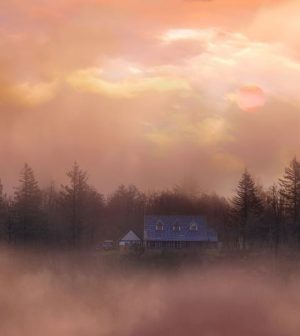- Could Your Grocery Store Meat Be Causing Recurring UTIs?
- Are You Making This Expensive Thermostat Error This Winter?
- Recognizing the Signs of Hypothyroidism
- 10 Strategies to Overcome Insomnia
- Could Artificial Sweeteners Be Aging the Brain Faster?
- Techniques for Soothing Your Nervous System
- Does the Water in Your House Smell Funny? Here’s Why
- Can a Daily Dose of Apple Cider Vinegar Actually Aid Weight Loss?
- 6 Health Beverages That Can Actually Spike Your Blood Sugar
- Treatment Options for Social Anxiety Disorder
Nova Scotia Wildfires Sending Unhealthy ‘Smoke Plume’ to U.S. Northeast

Large, uncontrolled wildfires in Nova Scotia are creating unhealthy air in the Northeast region of the United States, including parts of Connecticut.
This significant smoke plume is likely to cause elevated levels of fine particulate matter, the American Lung Association warned in its alert. Particulate matter contains microscopic solids or liquid droplets that are so small that they can be inhaled and cause serious health problems, according to the U.S. Environmental Protection Agency.
The lung association also offered tips for everyone — but especially children, older adults and people with lung diseases like asthma and chronic obstructive pulmonary disease (COPD) — to stay well despite the poor air quality.
- Start by staying indoors. If you live close to these areas where there is fire and a lot of smoke, stay inside to avoid breathing smoke, ashes and other pollution in the area.
- Keep doors, windows and fireplace dampers shut, preferably with clean air circulating through air conditioners on the recirculation setting.
- Watch your symptoms. With higher smoke levels, breathing can be more difficult. Call your doctor if you experience these symptoms.
- Protect your children and teens, who are more susceptible to smoke. They breathe in more air — and more pollution — into their developing lungs for their size than adults do.
- Ask for help. The American Lung Association’s Lung HelpLine at 1-800-LUNGUSA is staffed by nurses and respiratory therapists. They will answer your questions about the lungs, lung disease and lung health for free.
More information
The U.S. Centers for Disease Control and Prevention also offers tips on protecting yourself from wildfire smoke.
SOURCE: American Lung Association, news release, May 31, 2023
Source: HealthDay
Copyright © 2026 HealthDay. All rights reserved.










